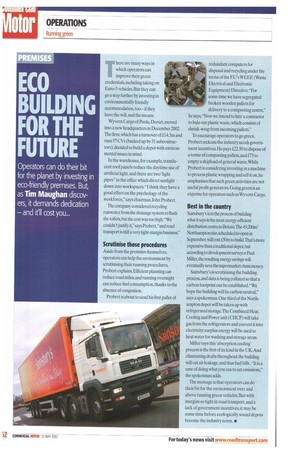ECO BUILDING FOR THE FUTURE
Page 52

If you've noticed an error in this article please click here to report it so we can fix it.
Operators can do their bit for the planet by investing in eco-friendly premises. But, as Tim Maughan discovers, it demands dedication — and it'll cost you... There are many ways in which operators can improve their green credentials, including taking on Euro-5 vehicles. But they can go a step further by investing in environmentally friendly accommodation, too —if they have the will, and the means.
Wyvern Cargo of Poole, Dorset, moved into a new headquarters in December 2002. The firm, which has a turnover of £14.5m and runs 57 CVs (backed up by 31 subcontractors), decided to build a depot with environmental issues in mind.
In the warehouse, for example, translucent roof panels reduce the daytime use of artificial light, and there are two 'light pipes" in the office which direct sunlight down into workspaces. "I think they have a good effect on the psychology of the workforce," says chairman John Probert.
The company considered recycling rainwater from the drainage system to flush the toilets, but the cost was too high."We couldn't justify it," says Probert,"and road transport is still a very tight-margin business."
Scrutinise those procedures
Aside from the premises themselves, operators can help the environment by scrutinising their running procedures, Probert explains. Efficient planning can reduce road miles, and running overnight can reduce fuel consumption, thanks to the absence of congestion.
Probert is about to send his first pallet of redundant computers for disposal and recycling under the terms of the EU's WEEE (Waste Electrical and Electronic Equipment) Directive."For some time we have segregated broken wooden pallets for delivery to a composting centre," he says. "Now we intend to hire a contractor to bale our plastic waste, which consists of shrink-wrap from incoming pallets."
To encourage operators to go green, Probert reckons the industry needs government incentives. He pays £22.50 to dispose of a tonne of composting pallets, and £73 to empty a skipload of general waste. While Probert is considering investing in a machine to process plastic wrapping and sell it on, he emphasises that such green activities are not useful profit generators. Going green is an expense for operators such as Wyvem Cargo.
Best in the country
Sainsbury's is in the process of building what it says is the most energy-efficient distribution centre in Britain.lhe 49,200m2 Northampton site,scheduled to open in September will cost E50m to build.That's more expensive than a traditional depot, but according to development surveyor Paul Miller, the resulting energy savings will eventually save the supermarket chain money.
Sainsbury's is scrutinising the building process, and data is being collated so that a carbon footprint can be established."We hope the building will be carbon neutral," says a spokesman. One third of the Northampton depot will be taken up with refrigerated storage.The Combined Heat, Cooling and Power unit (CHCP) will take gas from the refrigerators and convert it into electricity;surplus energy will be used to heat water for washing and storage areas.
Miller says this 'absorption cooling' process is the first of its kind in the UK.And eliminating drafts throughout the building will cut air leakage, and thus fuel bills ."It is a case of doing what you can to cut emissions," the spokesman adds.
The message is that operators can do their bit for the environment over and above running green vehicles. But with margins so tight in road transport, and a lack of government incentives, it may be some time before ecologically sound depots become the industry norm. •






















































































































































































